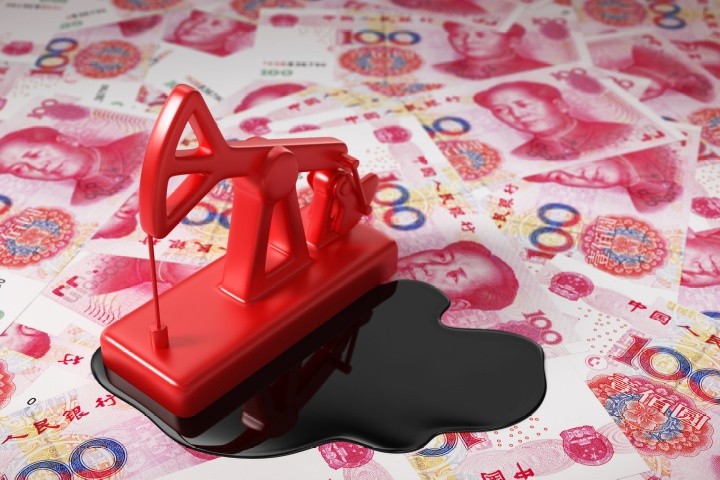by Angeline Tan, The New American:

December saw Chinese President Xi Jinping meeting the leaders of Saudi Arabia and the Gulf Cooperation Council (GCC) nations. During the meeting, Xi said Beijing had unveiled five “priority” areas in its ties with the Gulf countries for the future, such as the fulfillment of bilateral oil and gas transactions in the Chinese yuan.
Xi urged the GCC countries to use the Shanghai Petroleum and Natural Gas Exchange to conduct yuan-based energy deals. Also, China and Saudi Arabia inked more than $30 billion in trade deals during the visit.
TRUTH LIVES on at https://sgtreport.tv/
China’s plans to use the yuan in its oil trade with Gulf nations may lead to a new world energy order, with Xi’s trip signaling “the birth of the petroyuan,” showcasing China’s drive “to rewrite the rules of the global energy market,” based on a recent note from Credit Suisse analyst Zoltan Pozsar published in a U.K. newspaper.
Pozsar said China hopes to de-dollarize parts of the world after the U.S. dollar’s hegemonic status was used to undermine Russia. He also pointed out that Russia, Iran, and Venezuela accounted for 40 percent of OPEC+ proven oil reserves, with the GCC making up another 40 percent.
Pozsar claimed that Xi’s aforementioned declaration “marked the birth of the petroyuan,” acknowledging that this move was part of “a larger effort to de-dollarize” BRICS countries (Brazil, Russia, India, South Africa, and China) “and many other parts of the world after the weaponization of dollar foreign exchange reserves” coinciding with the onset of the Ukraine-Russia crisis last year.
During the GCC summit, Xi declared that over the next three to five years, China would not only drastically raise imports from GCC nations, but steer toward “all-dimensional energy co-operation,” Pozsar said.
“This could potentially involve joint exploration and production in places such as the South China Sea, as well as investments in refineries, chemicals and plastics. Beijing’s hope is that all of it will be paid for in renminbi [yuan], on the Shanghai Petroleum and Natural Gas Exchange, as early as 2025,” he added.
While Xi’s move did not immediately mean that the yuan has replaced the U.S. dollar as a reserve currency, “the petroyuan trade nonetheless comes with important economic and financial implications for policymakers and investors,” the U.K. news outlet stated.
Moreover, the report alluded to “the prospect of cheap energy,” which is “already luring western industrial businesses to China,” offering the example of the recent move of German chemical behemoth BASF’s main plant in Ludwigshafen.
“This could be the beginning of what Pozsar calls a ‘farm to table’ trend” in which “China tries to capture more value-added production locally, using cheap energy as a lure.”
Already, China is conducting trade with many partners, including Russia, in the yuan, amid efforts to distance itself from the dollar.
Ilya Kalenkov, director general of the Russian equipment manufacturer Evropeiskaya Elektrotekhnika, told Sputnik News that as the world makes futile attempts to adopt “green” energy, Russia, which is facilitating trade transactions with China in the yuan, has “fine” prospects in the global energy market for years to come.
Kalenkov posited that international oil reserves would most probably not be exhausted in the near future while the quantity and the accessibility of “black gold” will hinge on technological developments.
At the moment, oil is presently extracted from a depth of 3-3.5 kilometers, the typically regarded norm for oil production. Nonetheless, oil production four decades ago was conducted from a depth of just 1.5 kilometers, and all oil reserves at a greater depth were considered inaccessible, Kalenkov said.
While the U.S. dollar still remains the top currency for trade and foreign reserves, Beijing has been touting the yuan as a currency for oil deals with other partners such as Russia, especially after global U.S.-led sanctions on Russia following the onset of the crisis in February 2022, claimed Viktor Katona, lead crude analyst at Kpler.
As Western countries froze Russia’s currency reserves and boycotted its oil, Moscow sought Asia as an alternative crude market and overtook Saudi Arabia last year as China’s top oil supplier. Russia has basically become “an Asian nation that in my opinion has introduced the yuan into large-scale oil trade,” Katona told Insider.
Notwithstanding dollar proponents’ claims that the dollar’s liquidity and credibility would still enable it to maintain its dominance, Katona said that “it is naive to think that China will not be seeking to control the price of oil, that it would not want to conduct trade in the currency that it controls.”
In particular, the Federal Reserve’s wide-ranging monetary tightening campaign caused the dollar to rise last year. As oil deals are largely priced in dollars, a soaring greenback would make oil contracts more expensive, Katona said.
Ultimately, the petroyuan will also have regional influence, prompting many Asian countries to “reconsider their trading routines,” Katona said.
One of China’s major tenets of its commodity policy, he added, is draconian oversight over the nuts and bolts of its crude and currency trade that could help boost the country’s control over energy markets.
“It [China] tightly controls state-owned oil companies, sets directions for how much they can export. It caps the price of coal when necessary, centralizes the purchasing of iron ore when it senses that its companies are being treated differently,” Katona said.
Read More @ TheNewAmerican.com



